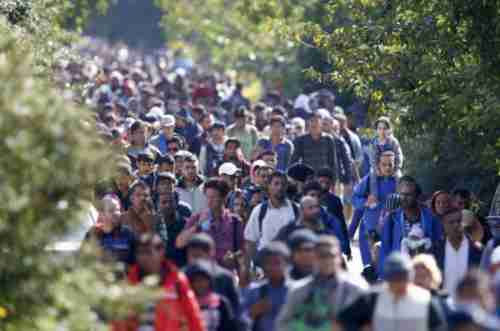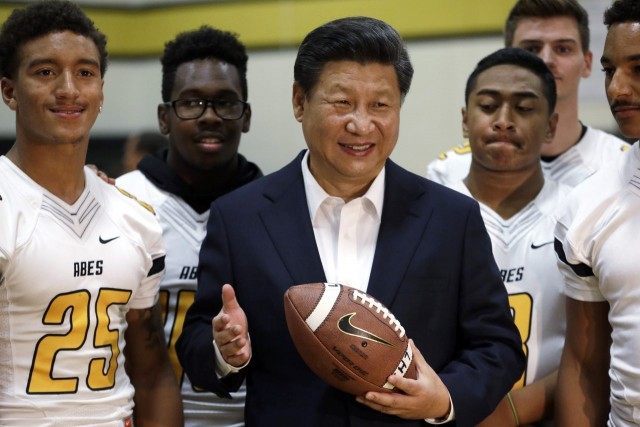This morning’s key headlines from GenerationalDynamics.com
- Tempers flare as EU leaders debate the migrant crisis
- Europe looks for ways to reduce the volume of migrants
- China’s Xi Jinping congratulates himself on stopping stock market crash
Tempers flare as EU leaders debate the migrant crisis

Migrants walk towards the Austrian border from Hungary on Wednesday. At least 7,000 people crossed from Hungary into Austria on Wednesday alone. (Reuters)
I heard one analyst say that the language being used by the EU leaders meeting in Brussels on Wednesday was the harshest that has ever been heard in public since the beginning of the EU. I am pretty sure is that not true. In 2005, I wrote about an acrimonious European Union summit ending in crisis, as Jean-Claude Juncker, Tony Blair and Jacques Chirac got into a furious shouting war over agricultural subsidies.
Still, there was harsh disagreement over the plan to relocate 120,000 migrants to EU countries by means of mandatory quotes. As we reported yesterday, that plan was passed by a vote of interior ministers on Tuesday. In the past, such a controversial plan would be passed by unanimous vote, but in this case, four Central European countries voted against the plan — Romania, the Czech Republic, Slovakia and Hungary.
It is pretty widely recognized that the plan is pretty useless anyway, for several reasons:
- There are 6,000-7,000 new migrants arriving in Europe every day, 480,000 so far this year. So the 120,000 in the plan only addresses a small part of the problem.
- If the EU assigns, say, 10,000 migrants to one particular country, the assignment is meaningless, since there’s nothing to stop the migrants from leaving that country and traveling to whatever country they want, at least among the 25 countries of the EU Schengen Area.
- As a matter of principle, the four countries that voted against the plan say that might accept migrants voluntarily, but are opposed to mandatory quotas, which violate national sovereignty.
With regard to the last point, a web site reader posted the following comment:
I absolutely agree with any country that opposes an imposed EU quota. It is analogous to the Americans on this website wanting to secure our OWN border.
Every country deserves to retain its culture. There are thousands of different cultures on the globe, each with their own carved out territory. They have their own traditions, foods, religions, family structure, etc. This is a great thing. If the people of a country want to retain their culture, and feel strongly enough about it, then I APPLAUD them for standing up and saying “NO” to this massive push for multiculturalism. And notice, multiculturalism is only pushed on mostly white nations (America and Europe). It’s a hard truth to digest, but it can no longer be ignored.
This seems like a perfectly reasonable, logical position to take, but it really is not true, and probably has never been true at any place and time in history. Huge waves of migration have always occurred, at all times and places, and there is no way to stop them.
The population of the European Union is 503 million, so even a million migrants would add only 0.2% to the population, so I’m not sure that the word “migration” even applies. But whatever it is, there is no way to stop it.
When the World War II survivors signed the 1957 Treaty of Rome, which led to the formation of the European Union, they knew from the horrors of two World Wars that migration would always occur, and they decided that trying to stop it was one way to increase pressures that lead to war. But the painful lessons of history are never remembered, and each generation has to relearn them. That’s the core principle behind Generational Dynamics. Irish Times and International Business Times and Bloomberg
Europe looks for ways to reduce the volume of migrants
At Wednesday’s meeting of EU leaders in Brussels, European Council president Donald Tusk said that with “millions of potential refugees from Syria” that may arrive in Europe, “The most urgent question we should ask ourselves tonight is how to regain control of our external borders.”
Rather than continuing to argue about mandatory quotas and internal borders, the meeting turned its attention to the question of how to reduce the number of migrants trying to enter Europe in the first place, and that would mean convincing them to remain in the Mideast.
The way to do that, it was thought, would be to spend a lot of money in support of the migrants, including these proposals:
- Donating at least $1.1 billion to UN aid agencies to help Syrian refugees;
- Sending more staff to shore up Europe’s external borders and in the western Balkans, through which many migrants pass;
- Giving more support to Lebanon, Turkey, Jordan and other countries neighboring Syria.
With regard to this, there has been one story after another in the last year that the World Food Program has not been receiving committed resources by many countries, with the result that they have had to cut back sharply on food for Syrian refugees in Jordan, Lebanon, Turkey, Iraq and Egypt. The WFP has had to drop one-third of Syrian refugees from its food voucher program in Middle Eastern host countries this year, including 229,000 in Jordan who stopped receiving food aid in September. According to a spokesman, the agency needed $236 million to keep the program — even in its scaled-back version — funded through November. No major donors have come forward.
The vote by the EU to provide $1.1 billion to the WPF will certainly be welcomed, and may prevent a lot of starvation.
But the fact is that the millions of potential migrants headed for Europe are not just going because they want a bigger plate of food for dinner. They’re going because they have a dream — steady work, going to college, sending their children to school, having a happy life — and none of the proposals that were discussed at Wednesday’s meeting will have any effect on those motivations at all. BBC and Guardian (London)
China’s Xi Jinping congratulates himself on stopping stock market crash
China’s president Xi Jinping is visiting Seattle Washington, while the Pope is visiting the other Washington. On Tuesday evening, he gave a speech in which he highlighted the government’s support for a transparent and open stock market.
The duty of government is to ensure a fair, open market and adjust the market order and avoid panic from happening. This time, Chinese government took steps to stabilize the market and contained panic in the stock market. And that avoided a systematic crisis. Mature markets in various countries have tried similar steps. The Chinese stock market has reached the phase of self-recovery and self-adjustment.
This has produced a fair amount of laughter among analysts. Xi thinks that by jailing reporters and bloggers who use words like “selloff” or “panic,” or punishing investors who “meddle” in the stock market by selling stocks, China’s government has managed to take its “fair, open market” and make it reach the phase of “self-adjustment.”
This is probably one of the best examples we have seen of a world leader who is publicly and clearly in a hopeless state of denial. I often say that Barack Obama does not have a clue what is going on in the world, or that Vladimir Putin is following a path that will bring destruction to everyone, including himself. It is tempting to think that any national leader, with access to as many experts as he wants, could not possibly be this stupid, but here we see Xi Jinping exhibiting such stupidity openly and publicly and shamelessly.
People often tell me that China would never start a war because it is bad for business or because China would lose or because some other reason. But someone who could believe that jailing reporters can end a stock market crash can also believe that China will win a war within 24 hours, because the US is too weak to fight or unwilling to fight. I hope that such people can now see the flaw in their reasoning. China Radio International (Beijing)
KEYS: Generational Dynamics, European Union, European Council, Donald Tusk, Romania, Czech Republic, Slovakia, Hungary, 1957 Treaty of Rome, Jean-Claude Juncker, Tony Blair, Jacques Chirac, World Food Program, Syria, Jordan, Lebanon, Turkey, Iraq, Egypt, China, Xi Jinping, Seattle
Permanent web link to this article
Receive daily World View columns by e-mail

COMMENTS
Please let us know if you're having issues with commenting.